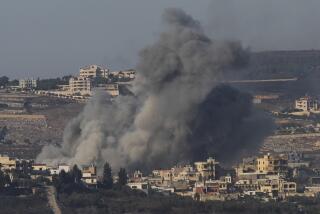MIDEAST : As Militias Are Kicked Out, the Face of Lebanon Changes : Properties being returned to the government have a long history in the land that was once run by men with guns.
BEIRUT — In a twist on an adage, repossession is nine-tenths of the law in Lebanon now, as authorities have begun to regain control of government buildings long occupied by this country’s various militias.
The pro-Iranian Hezbollah’s turn came this week when it began evacuating the Sheik Abdallah barracks in ancient Baalbek, seized in 1982. The Lebanese army regained control of the barracks Thursday.
The former army barracks played its own role in recent history in the Middle East. An underground jail in the 16-building compound was believed to have held some of the American hostages before the last were released last year.
The Iranian and Lebanese flags flew for more than a decade over the barracks, which housed several thousand Iranian Revolutionary Guards, deployed during the 1982 Israeli invasion of Lebanon. The guards’ training of Hezbollah fighters made the militia one of the most formidable forces resisting Israel in the 440-square-mile security zone it occupies in south Lebanon.
Fourteen properties--schools, hospitals and ministry buildings--also have returned to the Lebanese government since July 20 when it began tightening its control over areas once run by militias.
Last week, Lebanon’s most widely watched TV station, the Lebanese Broadcasting Co., evacuated a multistory building that belongs to the Ministry of Education. LBC is run by the Lebanese Forces, the Christian militia-turned-political party. More than a dozen other groups run similar unlicensed TV stations.
TV crews, including those from LBC, videotaped the hand-over as tanks and troops surrounded the building. There were no violent incidents during the event. But there also were no traces of LBC, which had already transferred to its new rented quarters. Before leaving, workers stripped the premises of windows, frames and other building improvements, which they claimed they had paid for.
The army also took back a Ministry of Health compound in a Beirut quarter called Qarantina. The Lebanese Forces’ predecessor, the Falangist militia, took over the area in 1975 after a sectarian cleansing that drove out thousands of poor Muslims. Under the Lebanese Forces’ control, a five-story underground bunker was added and the compound renamed the LF War Council. Thousands of detainees grabbed by the militia were interrogated and held there during Lebanon’s bitter, 16-year sectarian conflict, which ended last year.
The Progressive Socialist Party militia also has turned over the Palace of Beiteddine--an 18th-Century architectural treasure that once served as the summer residence of Lebanon’s presidents. The last president to reside there was Suleiman Franjieh, who served from 1970 to 1976 and who died last week.
After renaming it the People’s Palace, the late Walid Jumblatt, a Druze chief and leader of the Progressive Socialist Party, had reopened the building to the public. Druze guides at the palace were famous for their colorful remarks about the Lebanese presidency--a position open only to Maronite Catholics, traditional rivals of the Druze, who follow an offshoot sect of Islam.
Tourist sites all over the country were under the control of militias.
The famous caves of Jeita north of Beirut were held by the Lebanese Forces, who used adjacent buildings for ammunition and arms storage. The caves have not been reopened.
Reclaiming of properties comes as Lebanon prepares for its first legislative elections in 20 years. Security conditions prevented voting during the civil war.
More to Read
Sign up for Essential California
The most important California stories and recommendations in your inbox every morning.
You may occasionally receive promotional content from the Los Angeles Times.










